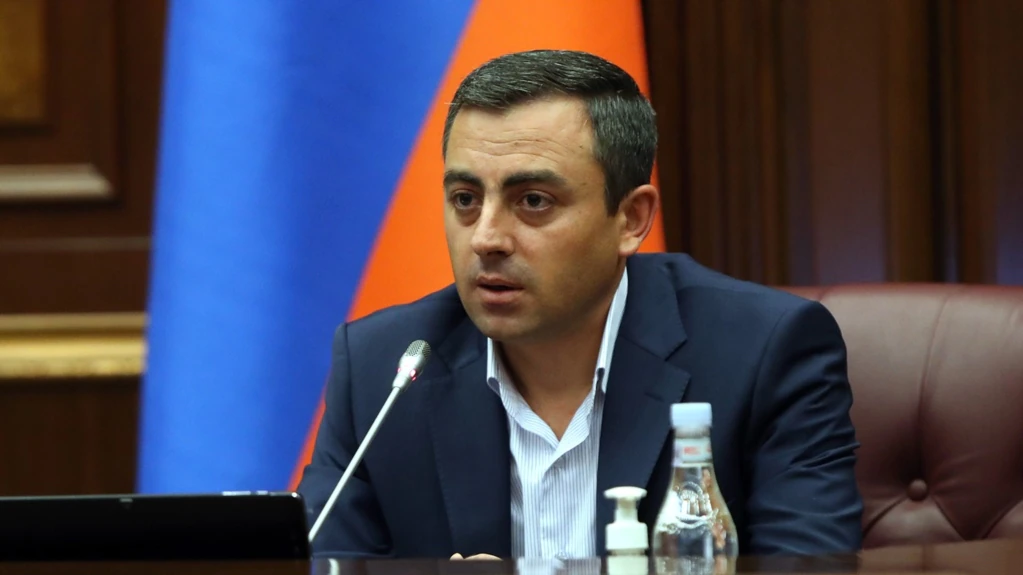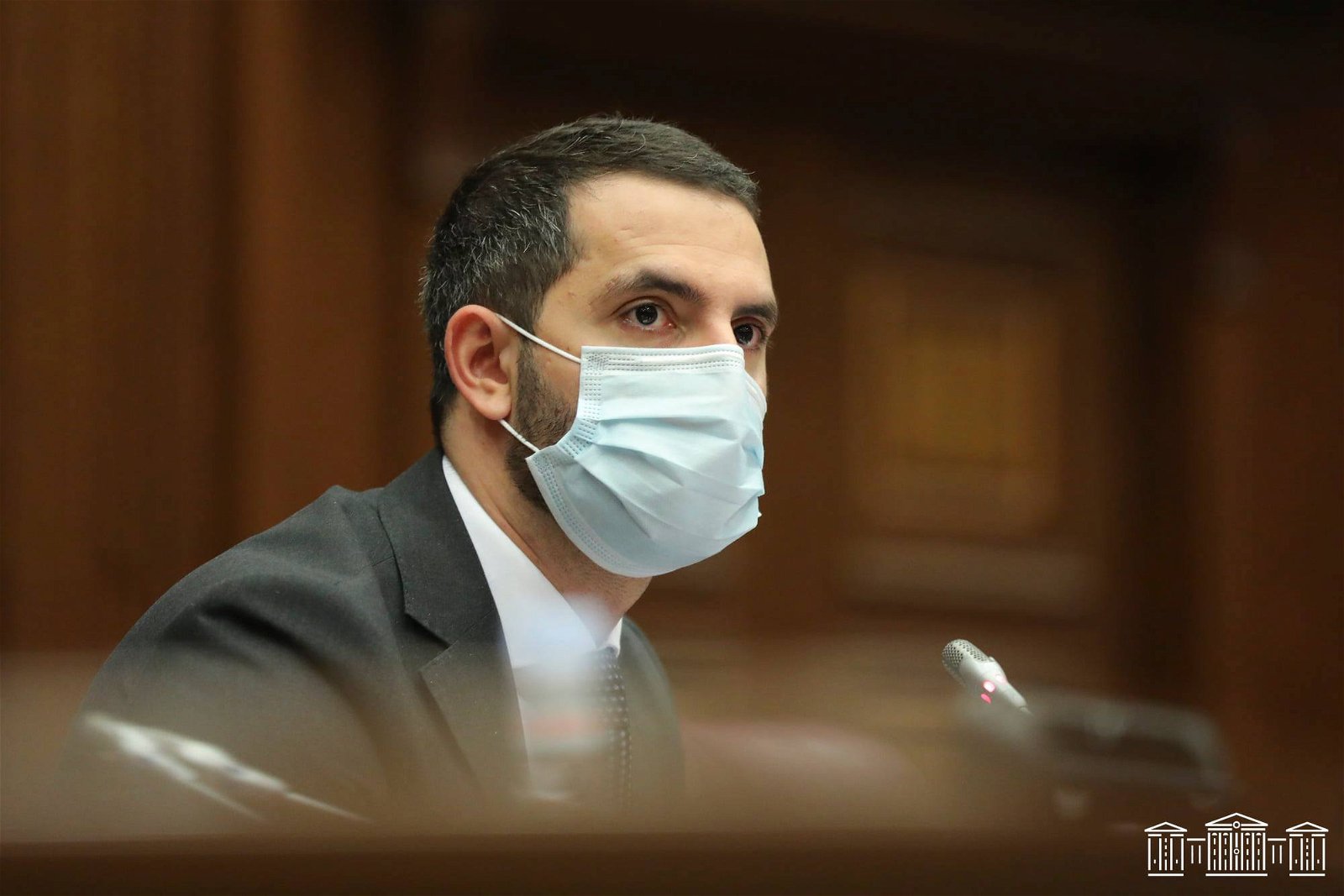An opposition lawmaker was forcibly dragged out of the parliamentary chamber for criticizing a pro-government deputy on Tuesday.
The present parliamentary term, which commenced after the snap elections in June of 2021, has been marked by hostility between the Civil Contract Party and the opposition factions, the Armenia Alliance and the I Have Honor alliance. State Protection Service (SPS) officers have been deployed to intervene in several physical altercations on the National Assembly floor. Leading parliamentarians with the ruling party have also faced criticism for instructing SPS guards to remove opposition deputies from the chamber for criticizing top government officials.
The latest incident took place after Gegham Manukyan, a deputy with the Armenian Revolutionary Federation (ARF), called Civil Contract Party lawmaker Vigen Khachatryan a “traitor” for his recent comments in the press regarding the Artsakh conflict.
“The person who renounces Artsakh is a traitor,” Manukyan insisted from the podium during the October 26 National Assembly sitting.
On October 15, Khachatryan told reporters that Armenian lawmakers should develop a unified position on the future status of Artsakh based on Armenian interests. “The idea that Armenia does not have a future without Artsakh is very dangerous, and it prevents us from guaranteeing the future of Artsakh,” he said.
The incident in the National Assembly comes on the heels of another rumored trilateral agreement between Armenia, Azerbaijan and Russia, one year after the signature of the ceasefire agreement ending the 2020 Artsakh War.
According to RIA Novosti, an unnamed source “familiar with the matter” told the Russian news agency that a meeting between Armenian PM Nikol Pashinyan, Azerbaijani President Ilham Aliyev and Russian President Vladimir Putin will apparently take place during the first 10 days of November.
Armenian news outlet Aliq media reported that two documents will be signed in early November, according to “reliable diplomatic sources.” Under the first document, Armenia and Azerbaijan will reportedly demarcate their shared border and recognize each other’s territorial integrity. The second document will address the opening of transport links between the two countries.
The ARF has expressed its concerns about these rumors. Senior members of the ARF claim that Pashinyan is prepared to cede new territories to Azerbaijan. “It will be a new capitulation agreement, [and] Armenia will make new concessions,” National Assembly deputy speaker and chair of the Supreme Council of Armenia of the ARF Ishkhan Saghatelyan told reporters on October 23.

Three days later, during a parliamentary sitting, deputy speaker from the ruling party Ruben Rubinyan interrupted Manukyan to warn him not to violate the “ethical rules” of the National Assembly. He asked Manukyan whether his accusation was directed toward a specific person.
When Manukyan confirmed that he was referring to Khachatryan, a shouting match ensued between the two lawmakers. Rubinyan ordered Manukyan’s microphone to be shut off and instructed the SPS to remove him from the podium. As two SPS guards dragged Manukyan away, Rubinyan called after them not to eject him from the chamber.

Rubinyan then shut off the audio on the live broadcast of the parliamentary session before calling a twenty-minute recess.
The presence of the SPS, a security agency that provides protection to top state officials, increased at the National Assembly since August 2, when the new parliament convened after the snap elections. On August 3, National Assembly speaker Alen Simonyan announced that he had updated security rules so that deputies would undergo inspections at checkpoints and metal detectors before entering the chamber.
On August 11, Simonyan suspended the livestream after a group of SPS guards entered the chamber to intervene in a brawl between the ruling and opposition parties. On August 25, SPS guards broke up two physical altercations, during which deputies rushed to the center of the room to kick and throw water bottles at each other. Earlier that week, Simonyan ordered SPS guards to remove an I Have Honor deputy from the chamber after she criticized the government.
Recent legislation increasing the penalties for insults and defamation have come under criticism from local and international rights organizations. In March, the National Assembly adopted a bill tripling the penalties for insult and defamation. President Armen Sarkissian refused to sign the bill into law and referred the matter to the Constitutional Court, which ruled that the law is constitutional earlier this month. In July, Parliament approved an amendment criminalizing grave insults, imposing harsher penalties for insults directed at public officials.
US-based human rights organization Freedom House cautioned that the amendments will “stifle free expression” and urged the Armenian government to “take the concerns of civil society and media organizations seriously, and strike down this legislation.”
Stricter regulations within the National Assembly have also impacted the activities of the press. Since August 3, journalists have not been permitted to enter the chamber without special permission or interview deputies in the hallway as they previously did. SPS guards have also been deployed to remove journalists from the chamber, sometimes harassing and inflicting violence on reporters.
Media organizations have been vocal in their criticism of these mounting restrictions on coverage of the National Assembly. The Committee to Protect Freedom of Expression, a domestic media watchdog, condemned these policies in its quarterly report released on October 22. The legislative initiatives curbing the rights of journalists “endanger freedom of speech and information and limit journalistic activity,” according to a statement released by the press freedom group.
The committee has recorded 13 cases of physical violence against reporters, 83 cases of various pressures applied to media outlets and 67 violations of the right to disseminate and receive information in the past nine months.
“Every time a tense situation arises during a parliamentary sitting, [the speaker] shuts off the livestream and instructs security forces to remove journalists from their workstation, forbidding photography. This is a grave violation of the activities of the press and the right of the public to be informed,” the statement reads.



Bravo ARF members, you are Armenian patriots. Our homeland is hijacked by the group of low irresponsible turk Armenians who don’t care about our homeland, our traditional and national values, and promoting Turkish agenda. they have no shame no brain, turk nikol stolen the image of our hero Monte and ruined abs destroyed all his dreams. God save Armenia and Artsakh and kép Armenians united across the Wolrd 🙏🏼🇦🇲✊
ARF in Armenia has a lot to answer for how they are being treated. ARF made the biggest mistake by collaborating with Robert Kocharian. It is very upsetting that the party who created today’s Armenia is, in this terrible predicament and ARF does not have a good standing in Armenia. Will not have a good future in Armenia. ARF should spend her energy and finances in Diaspora and get organized. Turks and Azerbaijanis are organized and becoming more dangerous. ARF wasting her time in Armenia.